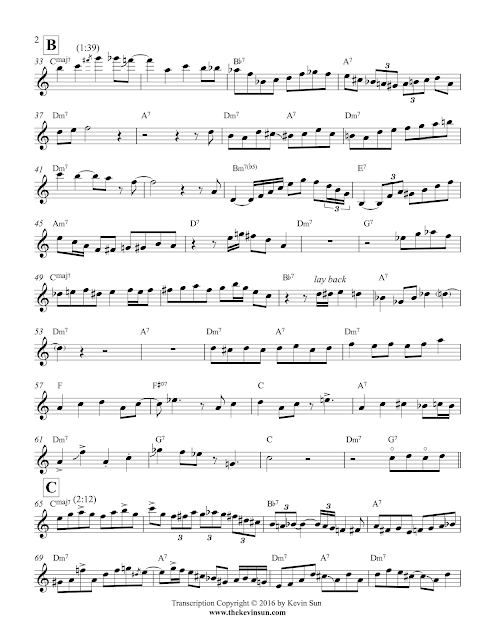Warne Marsh on "Sweet Georgia Brown" + "Foreground Music"
Release Record, Send Tape was recorded in 1959 and 1960 in New York City, but wasn't released until a decade later, after Warne Marsh mailed a postcard to bassist Peter Ind in England with the aforesaid eponymous message. The album is, for the most part, a collection of Marsh's improvisations on standards, with everything else—save for several piano solos—edited out. Saxophonist Bryan Qu hipped me to the album after I claimed that some of the best Marsh I'd heard wasn't the early '50s stuff, but actually some mid-'70s recordings he'd made in Denmark, collected on Two Not One (particularly the trio sessions with NHOP and Alan Levitt). After hearing Release Record, Send Tape, I was immediately persuaded to reconsider.
Some of the lines on RRST are freakishly long, but in a way they feel even longer than they are because of the density of contour shifts and pivots; phrase for phrase, there's more unexpected and unfamiliar harmonic and linear motion than I've heard from just about any other Marsh contemporary playing over standard changes. In Safford Chamberlain's invaluable (if at times slightly too psychoanalytical) Marsh biography, An Unsung Cat, Chamberlain notes an interesting pedagogical detail of Marsh's conception of phrases—interesting because it directly defies a tenet of Tristano philosophy:
It is interesting to note that in his later years Marsh voiced to a student, Paul Altman, his disagreement with what had become Tristanoite dogma, the contention that improvisation is note-to-note, not phrase-by-phrase. Doubtless the truth is that it is both, to varying degrees. But Marsh told Altman that the proof that it was phrase-by-phrase was in the breath: when you take a breath, he maintained, you take just enough to finish the phrase, which you must therefore have had in mind, or at least in the back of it. It could be argued equally well that one takes a breath simply because one needs it, and ends the phrase of necessity when the breath runs out. But whatever the logic of his argument, Marsh seems to have thought in phrases and taken his breaths accordingly. (226)
I spent some time working on Marsh's "Sweet Georgia Brown" solo, and I appreciated that the length of rest between phrases was largely commensurate to the length of the phrases that come before and after; long phrases deserve long rests.
As Ethan Iverson contends in polemical, Iversonian fashion, speaking of Marsh's improvisation on "It's You Or No One" from the same album: "I'm sorry, you cannot play jazz better than this."
Sweet Georgia Brown (recorded December 19, 1959)  "Sweet Georgia Brown" PDFs:
Foreground Music (recorded February 22, 1960) |






Thanks for the materials, very helpful!
ReplyDeleteInteresting and informative. Thanks
ReplyDelete